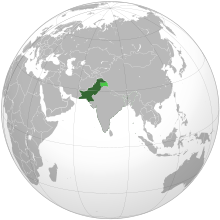A Nuclear Deal For Pakistan? – Analysis
By IPCS
By Martin de Lavernée
The Nuclear Non-Proliferation Treaty (NPT) countries and Nuclear Suppliers Group have expressed serious concerns over the security of nuclear plants and materials in Pakistan owing largely to domestic radicalization and internal strife, in addition to a deep involvement in proliferation by the AQ Khan network in a quasi-state setup. The threat posed by tactical warheads exacerbates the concerns as they are liable to be seized by terrorists due to the nature of their forward deployment. The tension on Pakistan’s borders and the nature of its doctrine does not allow a complete disclosure of information pertaining to its arsenal. This then results in a classic deadlock.

This commentary aims to provide an analysis of Pakistan’s renewed demand for a Pakistan-specific nuclear waiver on the same lines as given to India and as reiterated at the 2012 Nuclear Security Summit (NSS) in Seoul. How feasible is the implementation of such a demand given the pressures of the internal situation in Pakistan? A waiver does carry hope that the deadlock can evolve into a win-win situation. First, granting material to Pakistan under proper security measures and conditions would help making proliferation networks from China and other sources redundant. In other words, legalization of procurement reduces illegal procurement as well as gives leverage for those sources to be exposed and plugged. It also provides leverage to reduce the footprint of Pakistan’s military programme as it has for India. Moreover the integration of civilian nuclear structures within an accountable and open system minimizes the risk of proliferation and may herald a cultural shift towards transparency.
Despite appearances (such as the president chairing the National Command Authority (NCA) tasked with executing a nuclear strike), the military holds a decisive role in nuclear decision making, both civil and military, due to the conjoined nature of the programme. Forcing civilian control and a reduction in the size of the military programme rebalances civil-military relations and makes the energy security of Pakistan dependant on civilian control.
However, such collaboration is still far from reality, and it has to be recognized that there are few hopes that this option would be deemed top priority in the coming years. Strong opposition is to be expected, not least from India. The uncertain political future and the weight of internal public opinion in Pakistan – a constant suspicion towards collaboration with the West – are also roadblocks. The main opposition, though, would come from entrenched non-proliferation groups in the West.
There are, however, several indicators of risk mitigation at work in Pakistan. The first indicator is the effectiveness of the Pakistan Board of Nuclear Security. In this respect, the Strategic Plans Division (SPD), also Secretariat of the NCA, is designed to specifically monitor nuclear issues. As a military-led organization, the SPD exerts significant control and helps develop specific organizational skills in terms of nuclear security. Pakistan has been engaged in international legal and technical collaboration. Prominently since 2006, it has been a part of the US-sponsored Container Security Initiative (CSI) and has been deploying, with the assistance of the US, imaging and scanning technologies at its main sea-port installations, including at Gwadar. These measures come after the adoption of the 2004 Export Control on Goods, Technologies, Materials and Equipment Related to Nuclear and Biological Weapons and Their Delivery Systems Act and the establishement of a National Control List encompassing the main limitations settled by other international regimes. It can be deduced that the Pakistan military establishment helped the development of a reliable control authority and is able to act in a collaborative way.
The second indicator of credibility lies in the difficult separation of civilian and military programmes which will ease the move towards international credibility if carried out properly or could become a deal wrecker that furthers nuclear arms procurements. The political situation in Pakistan, and a seeming threat of quasi-state terrorist networks acting under Pakistan’s nuclear umbrella, would be the main arguments against the deal. However, the military is also the best guarantor of nuclear security. In terms of governance, as demonstrated in a 2007 IISS report, “Nuclear Black Markets: Pakistan, A.Q. Khan and the rise of proliferation networks”, it seems that the handover of the decision-making process to the military in the aftermath of the AQ Khan network disclosure helped develop more rigorous procedures with the creation of the Strategic Export Control Division (SECDIV) in 2007 under the Ministry of Foreign Affairs. But for now, it appears that more than the control in itself, the military leadership and the doctrine driving theses processes are the major issues at stake that will condition negotiation on a nuclear deal.
Given the tradeoffs involved, a significant political price will have to be paid by all parties involved. The real complexity of this deal, however, lies in the fact that the preconditions to realising this deal are also the very aims that such a deal would seek to create – namely civil political control and a reliable security apparatus.
Martin de Lavernée
Former Research Intern, IPCS
email: [email protected]
